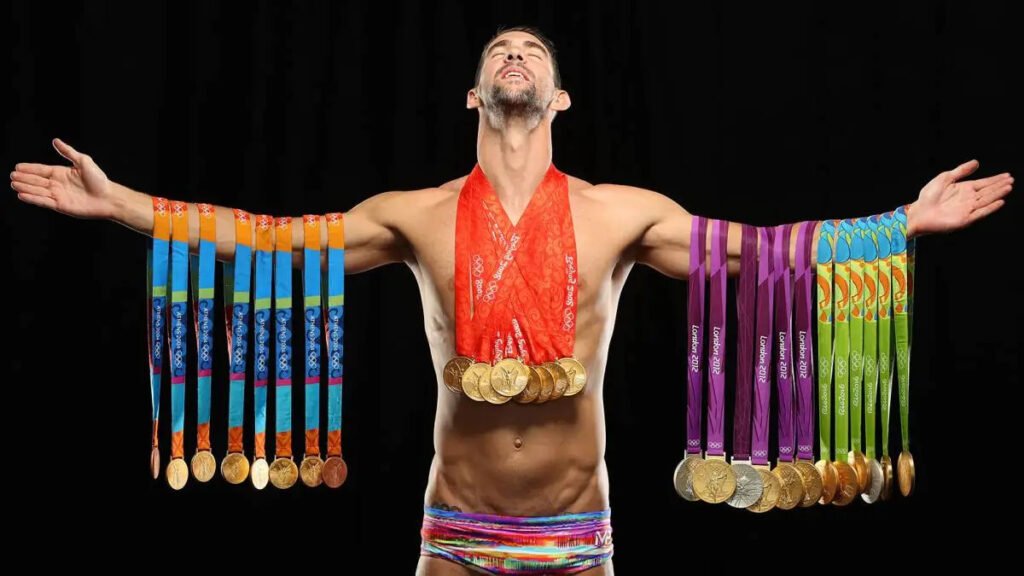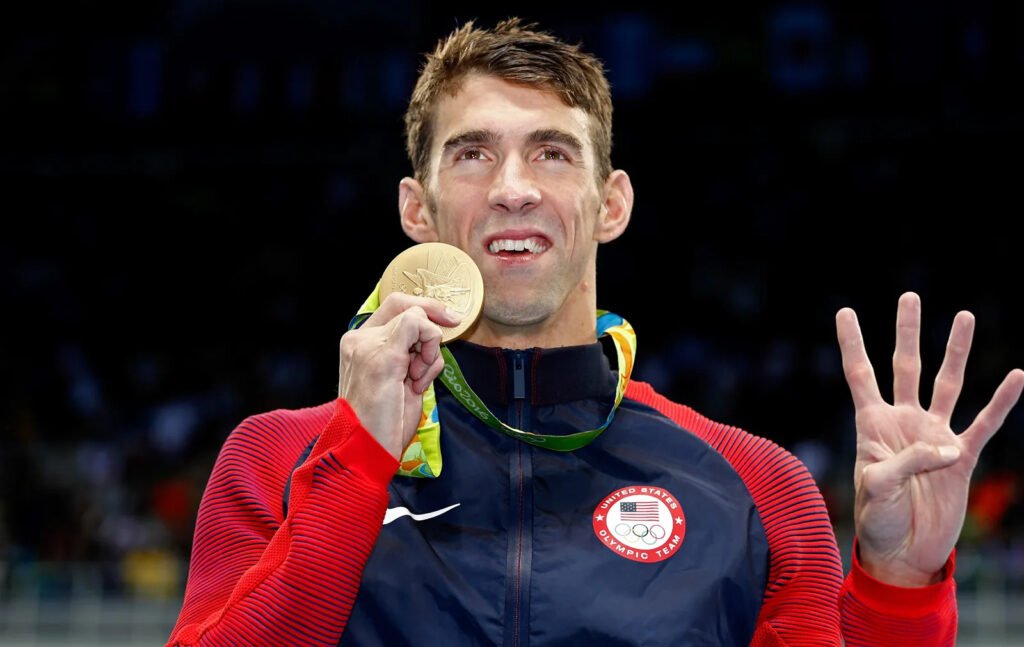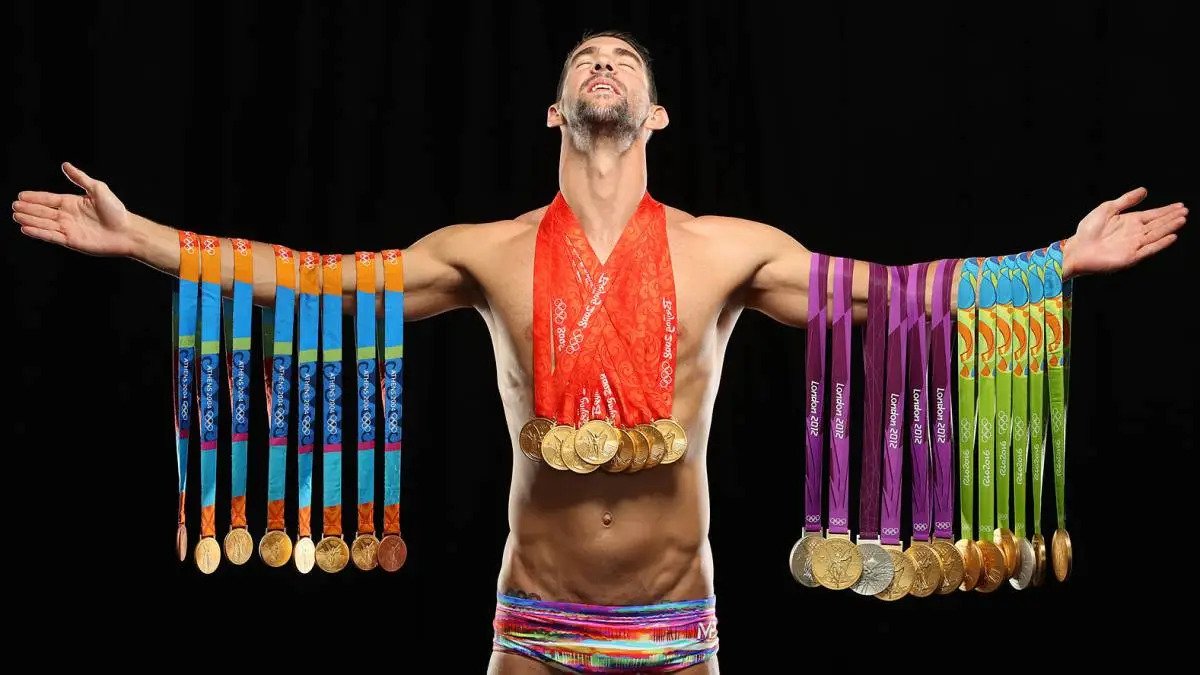Table of Contents
ToggleTop 10 Unknown and Interesting Facts About Michael Phelps
Many people consider Michael Phelps to be the best swimmer of all time, and his incredible accomplishments in the pool have made him a household figure. Phelps, who has won 23 gold medals at the Olympics, has broken multiple records and motivated people all around the world. Even so, there are still a lot of little-known facets of his life and career that are worthwhile learning about despite his notoriety.

When Phelps joined the North Baltimore Aquatic Club at an early age, his path to fame was set in motion. Phelps advanced through the ranks swiftly under coach Bob Bowman’s tutelage, making his Olympic debut in Sydney 2000 at the age of fifteen. Despite not winning a medal in Sydney, he shown remarkable talent, paving the way for an extraordinary career.
Phelps’ breakthrough came in the 2004 Summer Olympics in Athens, where he tied the record for the most gold medals won in a single Games with six gold and two bronze. In Beijing 2008, he exceeded this feat by winning an astounding eight gold medals, shattering Mark Spitz’s record of seven gold in one Olympics.
Phelps’ remarkable physical qualities—such as his larger-than-average wingspan, flipper-like feet, and lightning-fast reflexes—are responsible for his domination in the water. These qualities, together with his unmatched work ethic and mental tenacity, helped him succeed in medley, freestyle, and butterfly swimming competitions.
Phelps has openly discussed his challenges with mental health in addition to his physical accomplishments. He has used his platform to promote mental wellness and de-stigmatize mental health concerns among athletes. His transformation from an ambitious young swimmer to a global superstar has inspired millions of people all around the world.
In this blog post, we delve into the top 10 unknown and interesting facts about Michael Phelps that you might not have heard before.
1. Michael Phelps’ Love for Swimming Began as a Coping Strategy
At nine years old, Phelps received an attention deficit hyperactivity disorder (ADHD) diagnosis. He had trouble focusing and maintaining composure, so his mother suggested that he learn to swim as a method to release some of his energy. His lifetime devotion developed from what started out as a way to control his ADHD. Phelps was able to focus on his objectives both in and out of the pool thanks to the structure and discipline that swimming gave him.
For Phelps, swimming developed into a therapeutic outlet that helped him deal with the difficulties of ADHD rather than just being a sport. He was able to control his symptoms and feel in control of his life because to the routine and discipline of training. Phelps’ success in the water is evidence of how he overcame a possible challenge to develop one of his strongest suits.
2. Phelps Almost Quit Swimming After the 2012 Olympics
Phelps declared his retirement from competitive swimming following the 2012 London Olympics, where he added four golds and two silvers to his already outstanding collection. He was psychologically and physically worn out, and he wasn’t sure if he had the willpower to go on.
Phelps quickly understood, though, that he wasn’t prepared to give up the sport. He returned to the pool after a while and chose to compete in the Rio Olympics in 2016. This choice was well-made because Phelps went on to add five more gold medals and one silver to his collection, making history as the most decorated Olympian of all time.
Phelps’ journey serves as a compelling illustration of perseverance and the value of pursuing one’s passion despite uncertainty and exhaustion. In addition to cementing his reputation, his retirement from competitive swimming encouraged countless others to follow their aspirations despite all challenges.
3. Michael Phelps Has a Unique Physical Build
Phelps’ exceptional physical attributes are one of the things that make him such a skilled swimmer. Phelps, who is 6 feet 4 inches tall, has an atypically lengthy arm spread (6 feet 7 inches), even for a person his height. Because of this, he has an edge in the water and can stroke farther with each stroke.
Phelps’s ability to stay streamlined in the water is further enhanced by his unusually long torso and small legs. His size 14 feet function as flippers, enabling him to move through the water more effectively. In addition, Phelps’s hyperextended joints provide him more range of motion in his arms and ankles, which improves his swimming technique even more.
These physical qualities, along with his intense training and self-control, have allowed Phelps to excel in the pool. His distinct physique has frequently been referred to as “aquatic,” making it ideal for the rigors of professional swimming.
4. He Overcame Substance Abuse and Depression
Even with his extraordinary accomplishments, Phelps has struggled with depression and substance misuse, among other serious personal issues. Phelps experienced mental health issues following the 2012 Olympics, feeling disoriented and unclear about his purpose in life outside of swimming. He resorted to drugs and alcohol to help him deal with his emotional suffering.
A wake-up call came when Phelps was arrested for driving under the influence (DUI) a second time in 2014. Phelps started focusing on his mental health after realizing he needed assistance and enrolling in a rehabilitation program. Since then, he has turned into a vocal supporter of mental health awareness, candidly discussing his battles with depression and the value of getting treatment.
The stigma associated with mental health disorders has been lessened thanks to Phelps’ willingness to share his experience, especially in the sports industry. His journey from abject hopelessness to full recovery serves as a potent reminder that big obstacles can face even the most accomplished people, and that it’s acceptable to ask for assistance.

5. Phelps’ Diet During Training Was Astonishing
Phelps had a voracious appetite while he was training at his best. He ate an astounding 12,000 calories a day to fuel his strenuous exercises, which frequently involved five to six hours of swimming every day. Along with significant amounts of protein from eggs, meats, and dairy items, his diet consisted primarily of enormous meals of pasta, pizza, and energy drinks.
Phelps’ remarkable metabolism and the physical demands of his training program are responsible for his ability to take in and effectively use such a large amount of calories. It’s crucial to remember that this diet was created especially to accommodate an elite athlete’s needs throughout the hardest part of his career.
In order to preserve his health after giving up competitive swimming, Phelps drastically cut back on calories and switched to a more balanced diet. His story serves as a reminder of the value of healthy eating for sports performance and the necessity of modifying a diet to account for fluctuations in exercise level.
6. He and His Coach Have a Strong Relationship
Michael Phelps’ success has been largely attributed to his relationship with his longtime coach, Bob Bowman. When Phelps was just eleven years old, the two started working together, and Bowman saw his promise right away. They developed a close and lasting connection over the years, moving from a coach-student relationship.
Bowman pushed Phelps to his limits and instilled in him a strong work ethic with his demanding and rigorous teaching style. But he also gave Phelps the direction and encouragement he needed to overcome his professional obstacles. Bowman was instrumental in assisting Phelps in achieving his Olympic records because of his everlasting faith in Phelps’ ability.
Many people consider the relationship between Phelps and Bowman to be among the best coach-athlete partnerships in sports history. Phelps was able to compete at the top level for more than ten years in large part because of their mutual respect and trust.
7. Phelps Sets a Record for the Most Medals in a Single Olympics
Phelps earned eight gold medals in one Games at the 2008 Beijing Olympics, a feat never before accomplished by an Olympian. The previous record of seven gold medals held by swimmer Mark Spitz during the 1972 Munich Olympics was surpassed by this accomplishment.
Years of rigorous physical and mental preparation paid off in Phelps’ historic performance in Beijing. He took part in a demanding program of competitions that included three relay events, 200m freestyle, 200m and 400m individual medley, and the 100m and 200m butterfly. Phelps won every event, showcasing his adaptability, tenacity, and unwavering resolve.
Phelps gained international notoriety and cemented his reputation as a swimming great with this accomplishment. His eight gold medals in one Olympics are still a record, and it’s regarded as one of the biggest sporting achievements ever.
8. Michael Phelps Has Done Philanthropic Work With His Notoriety
In addition to his achievements in the pool, Phelps has improved the world by using his platform. He founded the Michael Phelps Foundation in 2008 with the intention of encouraging active, healthy lifestyles, especially in young people. The foundation’s flagship initiative, Individual Medley, or “IM,” emphasizes the value of goal-setting, physical training, and water safety.
The Michael Phelps Foundation works with groups like Special Olympics and the Boys & Girls Clubs of America to give impoverished areas access to swim instruction, water safety awareness, and physical exercise opportunities. Phelps has a strong desire to give back to the community and use his achievements to support others, especially the youth.
Apart from his work with the foundation, Phelps has been actively involved in several humanitarian endeavors, including as promoting awareness about mental health concerns. Beyond his accomplishments as an athlete, his commitment to philanthropy demonstrates his desire to improve the lives of others.

9. He’s Broken 39 World Records
Michael Phelps is a professional swimmer who has set and broken an incredible 39 world records. He is among the most decorated athletes in history because of this, which encompasses both solo and relay competitions. Phelps’ tremendous talent, work ethic, and commitment to the sport are all evidence of his ability to continuously perform at the highest level over an extended period of time.
At the 2001 World Aquatics Championships, Phelps broke his first world record in the 200-meter butterfly, starting his record-breaking run at the age of 15. Throughout his career, he broke record after record, with his final world record being established in 2009. Phelps dominated the water like no other, and his accomplishments have raised the bar for swimmers everywhere.
The records set by Phelps continue to motivate swimmers even after he retired. Not only are the medals he earned indicative of his greatness as a swimmer of all time, but so are the records he set, many of which are still in place today.
10. The Effect of Phelps on Swimming Will Last for Generations
The impact Michael Phelps has had on swimming goes far beyond his accomplishments in terms of records and medals. He has brought swimming to new heights of popularity and encouraged a new generation of swimmers to follow their aspirations. Phelps is a global inspiration for athletes because of his devotion to his craft, fortitude in the face of difficulty, and pursuit of excellence.
Phelps has also helped to progress training regimens and swimming skills. Many swimmers and coaches have embraced his novel technique to training, which featured underwater kicking and an emphasis on mental preparation. The psychological difficulties that athletes encounter have also come to light as a result of Phelps’ emphasis on the value of mental health.
Phelps is still mentoring and guiding the next generation of swimmers as a mentor and sport ambassador. His legacy will continue via the swimmers he has inspired and the records he has set, leaving a lasting effect on swimming for future generations.
Conclusion
Beyond becoming the most decorated Olympian of all time, Michael Phelps is a representation of quality, tenacity, and devotion. His path from an ADHD young child to a world-renowned athlete is replete with setbacks, victories, and important life lessons. These ten intriguing and little-known facts about Phelps highlight the breadth of his accomplishments and the complexity of his character—both on and off the pool.
Phelps’ narrative is one of perseverance, pushing limits, and never settling for anything short than excellence. For everyone, whether you love swimming or just appreciate great accomplishments, Michael Phelps’ life and career are an inspiration. For many years to come, both fans and players will find inspiration and influence in his legacy.



Oh awesome article